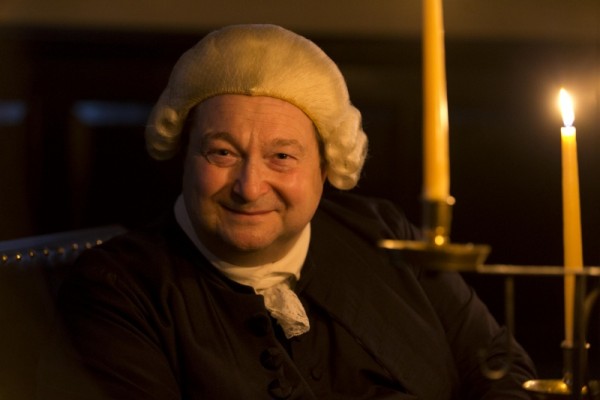
Colonial Williamsburg’s Michael Monaco portrays musician Peter Pelham.
By Karen Gonzalez
Peter Pelham’s musical influence found a way into the life of a Founding Father, according to new research.
A manuscript – or copybook – of music bearing the handwriting of Thomas Jefferson’s wife, Martha Wayles Jefferson, and Pelham, the 18th-century Bruton Parish Church organist and music teacher, offers a glimpse into the relationship between music student and teacher.
The Pelham/Jefferson music manuscript dates from 1760 into the 1770s, showing a two-decade relationship between the Pelham and Jefferson families, according to Dr. Nikos Pappas, an assistant professor of musicology, who found the volume in the Jefferson Library. Although Martha’s name is not in the copybook, her handwriting is unmistakable.
“The interesting part about the Jefferson/Pelham copy book is that the earliest part of it is in Pelham’s hand, and she starts to copy her own music in it. About two-thirds of it is in her own handwriting and one third is in Pelham’s,” said Pappas, who is currently taking part at a Colonial Williamsburg fellowship program through the John D. Rockefeller Jr. Library.
Martha Wayles - The early years
Martha was born into the prosperous Wayles family in 1748. Her father, a planter, slave trader, attorney and business agent, provided nicely for his family. As was common in that time, wealthy families educated their daughters in the social skills of the day, including keyboard skills, dancing and needlework. Her music teacher was Peter Pelham of Williamsburg.
Martha Wayles proved to be quite talented on the spinet and played at a high level of proficiency.
Her musical gifts extended beyond the keyboard. She also composed musical preludes to some of the longer compositions in the manuscript. More than elementary children’s pieces, these preludes demonstrate her mastery of music theory and prowess as a performer, but more important her creativity as an artist. She not only performed, but also personally shaped the pieces in her repertory.
“Lady South’s Minuet”
The recently discovered manuscript includes this piece, written in Martha Jefferson’s hand. It is performed here by Dr. Nikos Pappas.
Played by Dr. Nikos Papas on Spinet by Edward Wright, 2015, Colonial Williamsburg, Va., after Cawton Aston, 1726, in the Colonial Williamsburg collections.
Martha’s life was not always uncomplicated and easy. Her mother died from complications giving birth to her, and Martha was widowed at age 19 when her husband Bathurst Skelton died. She was by then the mother of an infant son named John, who also died before the age of 4.
Jefferson Courtship
After her first husband’s death, Martha returned to her childhood home in Charles City, County, Va. She met Thomas Jefferson around 1768 and married him in 1772. A renowned violinist himself, Thomas and Martha Jefferson reportedly spent many evenings playing music together as was the custom of the day.
“Martha Jefferson is a very mysterious figure in a way. When she passed, Thomas Jefferson destroyed everything of hers. All we have is a letter, an account book and this music book. He just couldn’t stand to have anything around that reminded him of her. To add to the loss is the fact that his library burned down in 1783. We are lucky to have anything of hers just because of the circumstances of what happened to her and the natural disasters,” Pappas said.
The new manuscript
Pappas noted that a music master of the time would often provide a book with music staff lines, which would contain the musical symbols and notes appropriate to the piece.
“The teacher would probably copy in a number of pieces if the student did not purchase sheet music,” Pappas explained.
Michael Monaco, who interprets Peter Pelham for the Colonial Williamsburg Foundation, said the musical relationship left an impression on Martha Jefferson.
“She was definitely a product of Pelham’s influence,” said Monaco, who is also a harpsichordist/keyboardist at the Foundation.
“Student and mentor – we believe that Pelham probably viewed Martha as a daughter-type figure and would have had that kind of paternal affection for her,” he continued. “It’s music that connects them, not politics, but music. The importance of the daily events of music, even when things are at their darkest and the most difficult times. That’s the unifying force.”
Leave a Reply